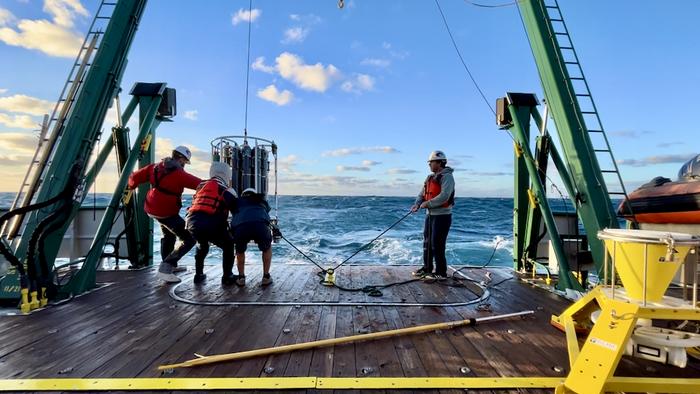South Florida’s Nearshore Reefs Less Vulnerable to Ocean Acidification, Study Finds

Credit: Photo: Tyler Christian, University of Miami Cooperative Institute for Marine and Atmospheric Studies.
South Florida’s Nearshore Reefs Less Vulnerable to Ocean Acidification, Study Finds
Results offer a glimmer of hope as climate change impacts coral reefs worldwide
Researchers studying South Florida’s coral reefs found that the region’s nearshore reefs and more sheltered inshore areas are less vulnerable to ocean acidification than previously thought – a major climate-related threat to coral reefs as ocean waters absorb more atmospheric CO2 from the burning of fossil fuels.
This new study, led by scientists at the University of Miami Rosenstiel School of Marine, Atmospheric, and Earth Science, and the National Oceanic and Atmospheric Administration’s (NOAA) Atlantic Oceanographic and Meteorological Laboratory (AOML) offers a glimmer of hope for Florida’s iconic coral reefs as ocean acidification, along with marine heat waves and other climate-related threats are impacting coral reefs worldwide.
“In contrast to many regions globally where ocean acidification is being exacerbated, we found that South Florida’s inshore reefs — and sheltered areas that co-exist with seagrass communities — are being buffered from the negative effects of acidification,” said the study’s lead author Ana Palacio-Castro, a researcher at the Rosenstiel School-based NOAA Cooperative Institute for Marine and Atmospheric Studies.
Ocean waters absorb atmospheric carbon dioxide, which results in a drop in pH levels, turning the water more acidic. This resulting ocean acidification impacts the ability of a wide range of marine life —from corals to clams—to build and maintain their calcium-based shells and skeletons, and ultimately compromises the structural integrity of coral reefs and the marine life that rely on them.
In this study, the researchers analyzed 10 years of continuous seawater samples collected at 38 monitoring stations across the Florida Reef Tract to assess carbonate chemistry variability among seasons, years, and reef areas, including ocean acidification. They looked at differences between Biscayne Bay and the Upper, Middle, and Lower Keys, and the inshore, mid-channel, and offshore reef zones.
The results showed potential ocean acidification refugia in inshore reefs with neighboring seagrass meadows as a result of enhanced primary production, highlighting the importance of the relationship that exists between coral reef and seagrass ecosystems to mitigate the impacts of future climate changes.
The results also suggest that Florida’s inshore reef structures could benefit from local mitigation strategies, such as reducing CO2 emissions, marine carbon dioxide removal or conserving intact seagrass meadows, according to the researchers.
“The findings underscore the importance of local monitoring to understand how ocean acidification is impacting our region and to identify potential acidification hotspots and refugia,” said Ana Palacio-Castro.
The study, titled “Coral reef carbonate chemistry reveals interannual, seasonal, and spatial impacts on ocean acidification off Florida,” was published in the American Geophysical Union journal Global Biogeochemical Cycles.
The project was supported by the South Florida Ecosystem Restoration Research Program (SFER) at NOAA’s Atlantic Oceanographic and Meteorological Laboratory (AOML) NOAA’s Ocean Acidification Program Project (grant # 20680), NOAA’s Coral Reef Conservation Program (grant # 743 as part of the National Coral Reef Monitoring Program). Data collection cruises were funded by NOAA’s Atlantic Oceanographic and Meteorological Laboratory and the State of Florida’s Fish and Wildlife Research Institute.
About the University of Miami
The University of Miami is a private research university and academic health system with a distinct geographic capacity to connect institutions, individuals, and ideas across the hemisphere and around the world. The University’s vibrant and diverse academic community comprises 12 schools and colleges serving more than 17,000 undergraduate and graduate students in more than 180 majors and programs. Located within one of the most dynamic and multicultural cities in the world, the University is building new bridges across geographic, cultural, and intellectual borders, bringing a passion for scholarly excellence, a spirit of innovation, a respect for including and elevating diverse voices, and a commitment to tackling the challenges facing our world. Founded in the 1940’s, the Rosenstiel School of Marine, Atmospheric, and Earth Science has grown into one of the world’s premier marine and atmospheric research institutions. Offering dynamic interdisciplinary academics, the Rosenstiel School is dedicated to helping communities to better understand the planet, participating in the establishment of environmental policies, and aiding in the improvement of society and quality of life. www.earth.miami.edu.
Journal
Global Biogeochemical Cycles
DOI
10.1029/2023GB007789
Method of Research
Observational study
Subject of Research
Animals
Article Title
“Coral reef carbonate chemistry reveals interannual, seasonal, and spatial impacts on ocean acidification off Florida,
Article Publication Date
26-Dec-2023
COI Statement
none




